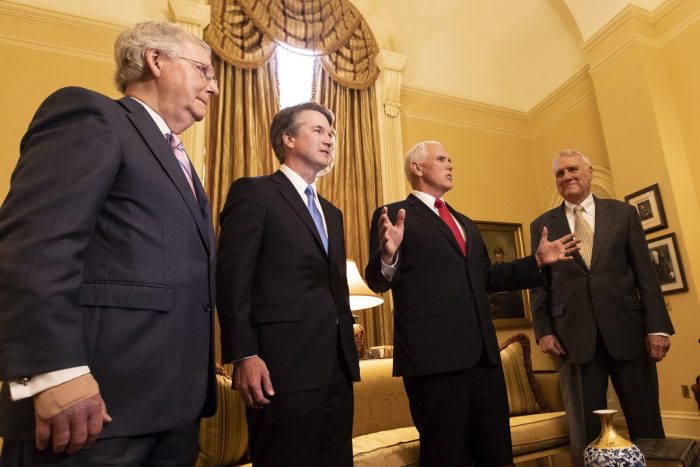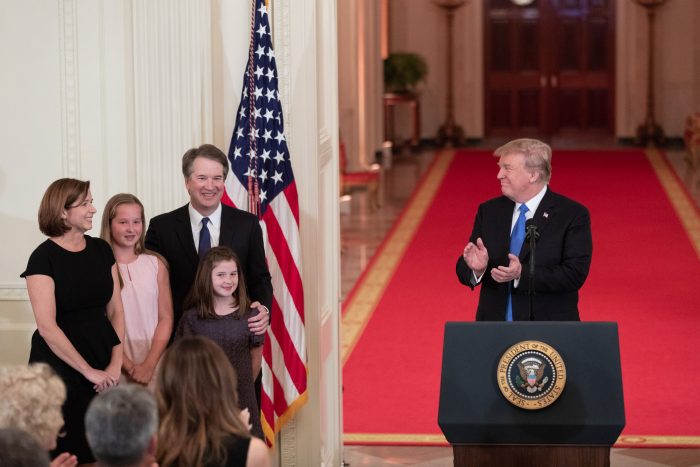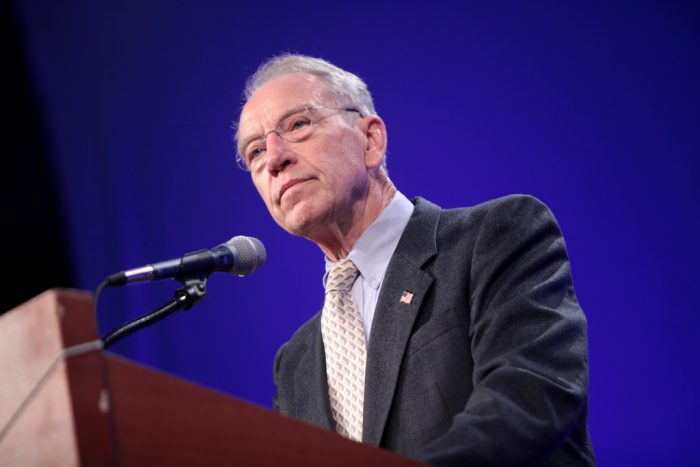The next Supreme Court justice may shift the balance of the Court for generations. Reproductive rights, the rights of workers to organize, the right to be free from torture, the ability to breathe clean air and drink clean water—all depend on who will occupy retiring Justice Anthony Kennedy’s seat. It makes sense, then, that we’d want to know as much as possible about nominee Brett Kavanaugh’s record, that we’d want to know not just how he thinks, but what he thinks and what he has done related to the most pressing issues of our time and on the issues that will impact millions of people for decades to come.

You’d think that the Senate would want to know, and would want us to know, everything we possibly could about the nominee; that would be reasonable—but you’d be wrong.
Senate Judiciary Chairman Chuck Grassley (R-IA)—the man leading the committee that is charged with reviewing the Kavanaugh nomination— has outright refused to request three years’ worth of records from Kavanuagh’s time in the White House. These records, from the period when Kavanaugh served as staff secretary to President George W. Bush, may contain information on Kavanaugh’s involvement in some of our nation’s darkest and most controversial histories.
For example, during his time as staff secretary, Kavanaugh would have managed executive documents concerning a federal abortion ban on certain second-trimester abortions. Wouldn’t you like to know if he asserted a position on these documents, especially considering abortion rights currently hang in the balance?
Retiring Justice Kennedy provided the determining vote in Planned Parenthood v. Casey and Whole Woman’s Health v. Hellerstedt, two decisions that recognized the constitutional right to abortion and upheld Roe v. Wade. But anti-abortion activists, with the help of their lawmaker friends, have been teeing up the next round of challenges to Roe, enacting 20-week abortion bans, fetal heartbeat bills, and other restrictions. Just this year, state legislators introduced 308 new abortion restrictions in 37 states.
Kavanaugh also served as staff secretary when the Bush Administration enacted its Global Gag Rule preventing foreign nongovernmental organizations receiving U.S. family planning funds from using non-U.S. funds to provide, counsel on, or give information about abortion, or even to lobby their own governments (with their own money) on abortion. Sound like the rule the Trump-Pence Administration is considering here in the U.S. for Title X funded family planning clinics? That’s because it is. So, we want to know, what role did Kavanaugh play, if any, on the Bush Global Gag Rule?
The staff secretary records would also expose Kavanaugh’s involvement in President Bush’s anti-LGBTQ agenda. In 2004, President Bush unsuccessfully tried to pass a constitutional amendment banning same-sex marriage. As staff secretary, Kavanaugh would have had the opportunity to prioritize this proposed amendment and influence the President’s actions. What role did he play?

But perhaps the records that could be most telling of Kavanaugh’s judgment and character concern the Bush Administration’s use of torture tactics. During Bush’s “War on Terror” after 9/11, the Central Intelligence Agency (CIA) was instructed through legal memos (more commonly known as the Torture Memos) to use enhanced interrogation techniques on terrorism suspects, including sleep deprivation, stress positions, and waterboarding. In his 2006 D.C. Circuit Court nomination hearing, Kavanaugh claimed to have no knowledge of the memos. However, the Washington Post later reported that Kavanaugh had a heated discussion with White House lawyers in 2002—two years before the torture memos were released—about whether the Supreme Court would uphold the Bush Administration’s decision to deny lawyers for terrorism suspects.
Judiciary Committee Member Senator Dick Durbin has stated that he felt “perilously close to being lied to” by Kavanaugh about his involvement with Bush’s torture and detainee policies during his 2006 hearing. “He had to know he was misleading me,” said Senator Durbin, “and the committee and the people who were following this controversial nomination.”
So, we have a nominee who was a former political operative, a nominee who may have lied to the Senate Judiciary Committee once before, a nominee who was handpicked by a right-wing organization with a political agenda—but the Senate doesn’t want to see his full record?
Chairman Grassley’s refusal to request these essential records is not only completely unjustifiable, it is completely unprecedented. During the judicial confirmation process for Justice Elena Kagan, who previously worked in the Clinton White House before sitting on the bench, Republican Senators demanded, and received, all of Kagan’s records from the National Archives and the Clinton Presidential Library. There is no reason why Brett Kavanaugh should receive special treatment in his confirmation process. Republicans cannot be allowed to rush the process just so they can solidify a conservative Justice before the midterm elections.

Chairman Grassley is preventing the Senate Judiciary Committee from doing the most significant part of its job. For the first time in history, Democratic Senators on the Judiciary Committee had to file a Freedom of Information Act (FOIA) request for the full scope of records pertaining to a Supreme Court nominee (a request that will likely not be filled before the confirmation hearings begin on September 4, a date selected by . . . Chairman Grassley). But all Senators, not just Democrats, should demand that Chairman Grassley do his due diligence.
Protecting our nation and its democracy from corrupt Justices is a non-partisan issue—plain and simple. And yet with Republican support, Chairman Grassley is deliberately trying to withhold records and lead a judiciary review process that is purposefully not transparent. But why? What are Republicans trying to hide from the American people?
What we do know about Brett Kavanaugh strongly suggests that if he is confirmed, my rights will be jeopardized. Kavanaugh would be a justice that would prioritize the wealthy and powerful (like Senator Grassley) and leave everyday American people in the dirt. His record suggests that he would not only overturn or significantly roll back Roe v. Wade, but that he would gut the Affordable Care Act, protect polluters, undermine workers, and serve as a rubber stamp for broad claims of presidential power.
The Supreme Court has the final say in our nation. Each Justice has the power to create significant impacts on every person living in the United States. We can’t afford to allow Chairman Grassley to get away with jeopardizing our human rights just so he can advance his party’s ideological agenda. It is his responsibility as a Senator and as Chairman of the Judiciary Committee to review all of Brett Kavanaugh’s records from the National Archives and the Bush Presidential Library. To do anything less would be unjust and a disservice to our nation, its democracy, and to the American people—myself included.
